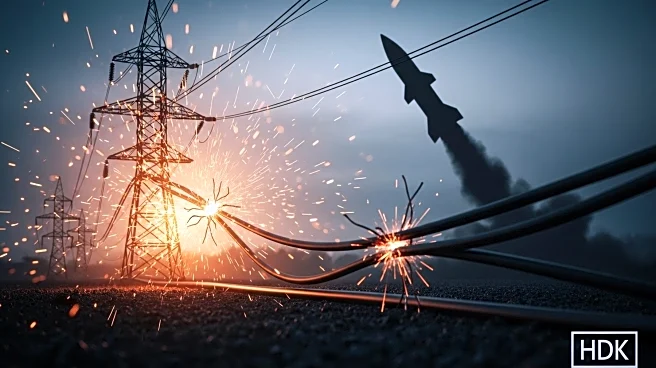What's Happening?
Russia has launched a series of attacks on Ukraine's power grid, aiming to cripple the country's energy infrastructure before winter. The strikes have resulted in injuries and significant damage, with Ukrainian President Volodymyr Zelensky reporting over 3,100 drones, 92 missiles, and 1,360 glide bombs used in the past week. Moscow has expressed concern over the potential U.S. provision of Tomahawk cruise missiles to Ukraine, following discussions between President Trump and Zelensky. The attacks have targeted energy infrastructure in various regions, including Donetsk, Odesa, and Chernihiv, causing widespread blackouts and damage.
Why It's Important?
The ongoing attacks on Ukraine's energy infrastructure highlight the strategic importance of energy resources in the conflict. Russia's efforts to disrupt Ukraine's power supply before winter aim to weaken public morale and resilience. The potential U.S. support with Tomahawk missiles could shift the balance, enhancing Ukraine's defense capabilities. This development could escalate tensions between Russia and the U.S., impacting international relations and security dynamics. The situation underscores the critical role of energy infrastructure in modern warfare and the geopolitical implications of military aid.
What's Next?
Ukraine is seeking tighter sanctions on buyers of Russian oil to cut off financial support for the war. Discussions between President Trump and Zelensky may lead to increased U.S. military aid, including long-range precision strike weapons. A senior Ukrainian delegation is expected to visit the U.S. to further these talks. The Kremlin has expressed extreme concern over the potential provision of Tomahawk missiles, indicating possible diplomatic or military responses. The situation remains fluid, with potential for further escalation as winter approaches.
Beyond the Headlines
The attacks on Ukraine's energy infrastructure reflect broader geopolitical strategies, where energy resources are used as leverage in conflicts. The potential U.S. involvement with missile support could redefine alliances and provoke reactions from other global powers. The ethical implications of targeting civilian infrastructure in warfare raise questions about international humanitarian laws and the protection of non-combatants. Long-term, the conflict may influence global energy markets and policies, as nations reassess their energy security and dependency.










